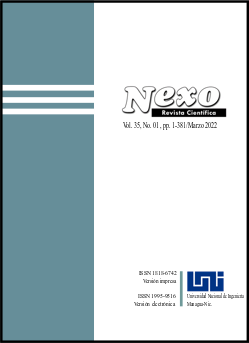Scientific assessment of negative changes in the state of karst groundwater
DOI:
https://doi.org/10.5377/nexo.v35i01.13956Keywords:
Karst Water Vulnerability Assessment, Non-Centralized Water Supply, Geoelectric Method, Karst ProcessesAbstract
Centralized water supply in remote settlements is often difficult or impossible, so there is a need to use a non-centralized water supply. The article develops a method for an expert assessment of the negative change in the state of underground karst waters based on a paired analysis of complex indicators of the protection of the aquifer. To assess the vulnerability of non-centralized water supply sources, five factors are used, including the geological structure of the territory, the level of surface and underground runoff, the development of the karst network, precipitation regime electrical conductivity, and mineralization of groundwater. The test was performed using the method of inversely weighted distances (IDW). The vulnerability assessment of karst waters was carried out in the area of 10 key control points identified during the deployment of the hydrogeological control system in 2017. Based on various geological and hydrological indicators, the discrepancy between the vulnerability assessment of karst waters was no more than 15 %. The conditions under which it is advisable to use direct measurements or geoelectric methods to monitor karst groundwater's state are identified.
Downloads
Downloads
Published
How to Cite
Issue
Section
License
Copyright (c) 2022 Array

This work is licensed under a Creative Commons Attribution 4.0 International License.
The authors who publish in Nexo Scientific Journal agree to the following terms:
- Authors retain the copyright and grant the journal the right of the first publication under the license Creative Commons Attribution License https://creativecommons.org/licenses/by/3.0/, which allows others to share the work with a recognition of the authorship of the work and the initial publication in Nexo Scientific Journal.
- Authors may separately establish additional agreements for the non-exclusive distribution of the version of the work published in the journal (for example, in an institutional repository or a book), with the recognition of the initial publication in Nexo Scientific Journal.
- Authors are allowed and encouraged to disseminate their works electronically (for example, in institutional repositories or in their own website) before and during the submission process, as it can lead to productive exchanges, as well as earlier and greater citation of published works.











